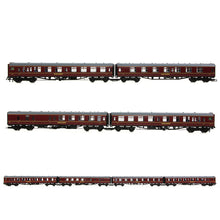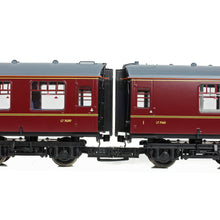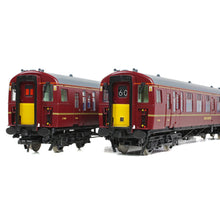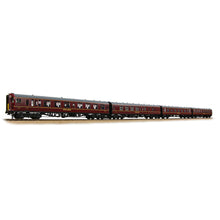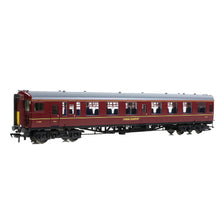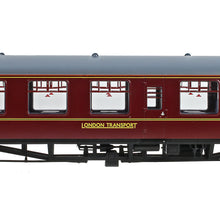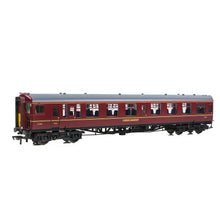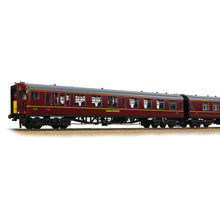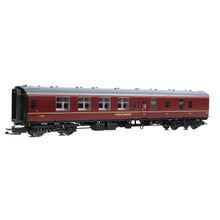
Class 438 4-TC 4-Car MU 428 London Transport Lined Maroon
32-645
Bachmann
Branchline
Era - Era 9
Running Number - Unit No. 428
Additional Info 1 - DTSO No. LT76297, TFK No. LT71163, TBSK No. LT70823 & DTSO No. LT76324
Additional Info 2 - H.I Headlight at one end only as per prototype
Accessories - Yes
Motor Type - N/A
DCC - 21 Pin Socket
Speaker? - Speaker Ready
DCC Fans - N/A
Tinted Windscreen Glazing? - N/A
Auto-Release Couplings? - No
Bach-Up Stay Alive? - No
Firebox Lighting - N/A
Directional Lighting - Yes
Cab Lighting - Yes
Interior Lighting - Yes
Weathered - No
Preserved - Yes
Passengers Fitted? - No
Supplied with Load - N/A
Supplied with Etched Plates? - N/A
Length (over couplings) - 1080mm
NEM Couplings - Yes (Outer Ends Only)
Sprung Buffers - No
Tender Pickups - N/A
Adjustable Tender Drawbar - N/A
-
-
The Class 438 4-TC makes its debut in the Bachmann Branchline OO Scale range with this model depicting London Transport Set No. 428. This officially licensed product has been produced in conjunction with London Underground to model the 4-coach unit that operates out of Ruislip Depot on railtours and charters, and visits preserved railways for galas and events, making it ideal for anyone modelling the current scene.
The Bachmann Branchline model of the 4-TC was first developed in conjunction with Kernow Model Rail Centre. Appearing in the main Bachmann Branchline range for the first time, the four car unit depicts the 4-TCs that operated both in multiple with EMUs and as loco-hauled coach sets from their introduction in the mid-1960s to their final operations under BR in 1994.
This high fidelity model boasts an impressive specification with finely detailed bodyshells and underframes, adorned with many separate parts to capture the characteristics of the real units. Inside, the detailed and decorated interior is made visible by the interior lighting, which can be controlled using the chassis-mounted switches, or when a DCC decoder is fitted, via a dedicated DCC function. Directional lighting is also included, which again can be controlled via switches or DCC functions, and a high intensity headlight is fitted at one end only, as sported by the prototype. Whilst the real units were unpowered, the sounds of auxiliary gear and general running noise would still be heard when the units are in motion and so to this end, provision is made for anyone wishing to add sound to their model with a space and connections for a speaker to be fitted in conjunction with a suitable third-party DCC sound decoder.
Decorated in the rich maroon livery of London Transport and with the lining, including orange lining at cantrail level, numbering and London Transport logos all added to the highest standards using specialist printing techniques, this new model is sure to be a stunning addition to any modern collection.
MODEL FEATURES:
CLASS 438 4-TC HISTORY
The 4-TC (4-Car Trailer Control) units were created between 1966 and 1967 by converting Mk1 loco-hauled coaches and consisted of two Driving Trailer Second Opens (DTSO), a Trailer First Corridor (TFK) and a Trailer Brake Second Corridor (TBSK). A small number of 3-car units were initially made which omitted the TFK, but these soon had a TFK added to bring their formation up to four coaches. The 4-TCs were required to work the London Waterloo to Weymouth line which had been newly electrified but only as far as Bournemouth due to a lack of funds. To overcome this, highly-powered 4-REPs were introduced which operated from London to Bournemouth propelling one or two 4-TCs. At Bournemouth, the unpowered 4-TC(s) would be uncoupled, and a Class 33/1 diesel locomotive would haul them to Weymouth. On the return journey, the Class 33/1 would propel the units back to Bournemouth where they would couple to a 4-REP for the return journey to London. In addition to these operations, the 4-TCs could also work in multiple with Class 73s, Class 74s and compatible 1951-/1957-/1963-built EMUs and with a driving cab at each end, they could be marshalled at either end of a train and worked in multiple from either cab. Despite being unpowered, the 4-TCs were regarded as Electric Multiple Units (EMUs) by the Southern Region.
Aside from their usual area of operation between London and Weymouth, the 4-TCs could frequently be seen throughout the South Western division of the Southern Region. Their days were numbered however when the line to Weymouth was electrified in 1988, and most had been withdrawn by 1990. Two units were retained until 1994 for use on Premier Charters ; and whilst operating on railtours 4-TCs reached many parts of the British Rail network including Birmingham, Cardiff, Meldon and Barnstaple.
Following their withdrawal by BR, eight Class 438 vehicles were acquired by London Underground in 1992. Today, four of these vehicles formed as one 4-TC set remains with London Undeground and this is used for railtours and charters on the London Underground Metropolitan line and national main line, and for hire to heritage railways for galas and special events. The 4-TC forms part of a rake that variously includes the two London Transport livered Class 20 diesel locomotives Sherlock Holmes ; and Sir John Betjeman ;, E Class steam locomotive Met 1 ;, Metropolitan-Vickers electric locomotive Sarah Siddons ;, the LT-liveried Inspection Saloon No. 17 Florence Nightingale ;, and other mainline locomotives.
Expected delivery Winter 2024 subject to availability
32-645
Bachmann
Branchline
Era - Era 9
Running Number - Unit No. 428
Additional Info 1 - DTSO No. LT76297, TFK No. LT71163, TBSK No. LT70823 & DTSO No. LT76324
Additional Info 2 - H.I Headlight at one end only as per prototype
Accessories - Yes
Motor Type - N/A
DCC - 21 Pin Socket
Speaker? - Speaker Ready
DCC Fans - N/A
Tinted Windscreen Glazing? - N/A
Auto-Release Couplings? - No
Bach-Up Stay Alive? - No
Firebox Lighting - N/A
Directional Lighting - Yes
Cab Lighting - Yes
Interior Lighting - Yes
Weathered - No
Preserved - Yes
Passengers Fitted? - No
Supplied with Load - N/A
Supplied with Etched Plates? - N/A
Length (over couplings) - 1080mm
NEM Couplings - Yes (Outer Ends Only)
Sprung Buffers - No
Tender Pickups - N/A
Adjustable Tender Drawbar - N/A
-
-
The Class 438 4-TC makes its debut in the Bachmann Branchline OO Scale range with this model depicting London Transport Set No. 428. This officially licensed product has been produced in conjunction with London Underground to model the 4-coach unit that operates out of Ruislip Depot on railtours and charters, and visits preserved railways for galas and events, making it ideal for anyone modelling the current scene.
The Bachmann Branchline model of the 4-TC was first developed in conjunction with Kernow Model Rail Centre. Appearing in the main Bachmann Branchline range for the first time, the four car unit depicts the 4-TCs that operated both in multiple with EMUs and as loco-hauled coach sets from their introduction in the mid-1960s to their final operations under BR in 1994.
This high fidelity model boasts an impressive specification with finely detailed bodyshells and underframes, adorned with many separate parts to capture the characteristics of the real units. Inside, the detailed and decorated interior is made visible by the interior lighting, which can be controlled using the chassis-mounted switches, or when a DCC decoder is fitted, via a dedicated DCC function. Directional lighting is also included, which again can be controlled via switches or DCC functions, and a high intensity headlight is fitted at one end only, as sported by the prototype. Whilst the real units were unpowered, the sounds of auxiliary gear and general running noise would still be heard when the units are in motion and so to this end, provision is made for anyone wishing to add sound to their model with a space and connections for a speaker to be fitted in conjunction with a suitable third-party DCC sound decoder.
Decorated in the rich maroon livery of London Transport and with the lining, including orange lining at cantrail level, numbering and London Transport logos all added to the highest standards using specialist printing techniques, this new model is sure to be a stunning addition to any modern collection.
MODEL FEATURES:
- Bachmann Branchline OO Scale
- Era 9
- Unit is Preserved
- Pristine London Transport Lined Maroon livery
- Set No. 428
- 4-Car Unmotorised Unit comprising DTSO No. LT76297, TFK No. LT71163, TBSK No. LT70823 and DTSO No. LT76324
- Accessory Pack
- NEM Coupling Pockets (outer ends)
- Conductive Couplings with Integral Close Coupling Mechanisms Between Vehicles
- Directional Lighting
- Cab and Interior Lighting
- Unit Ready to Accept a Speaker
- Equipped with a 21 Pin DCC Decoder Socket Recommend Decoder item No. 36-557A (required to operate the lighting functions when used on DCC)
- Length 1080mm (over couplings)
CLASS 438 4-TC HISTORY
The 4-TC (4-Car Trailer Control) units were created between 1966 and 1967 by converting Mk1 loco-hauled coaches and consisted of two Driving Trailer Second Opens (DTSO), a Trailer First Corridor (TFK) and a Trailer Brake Second Corridor (TBSK). A small number of 3-car units were initially made which omitted the TFK, but these soon had a TFK added to bring their formation up to four coaches. The 4-TCs were required to work the London Waterloo to Weymouth line which had been newly electrified but only as far as Bournemouth due to a lack of funds. To overcome this, highly-powered 4-REPs were introduced which operated from London to Bournemouth propelling one or two 4-TCs. At Bournemouth, the unpowered 4-TC(s) would be uncoupled, and a Class 33/1 diesel locomotive would haul them to Weymouth. On the return journey, the Class 33/1 would propel the units back to Bournemouth where they would couple to a 4-REP for the return journey to London. In addition to these operations, the 4-TCs could also work in multiple with Class 73s, Class 74s and compatible 1951-/1957-/1963-built EMUs and with a driving cab at each end, they could be marshalled at either end of a train and worked in multiple from either cab. Despite being unpowered, the 4-TCs were regarded as Electric Multiple Units (EMUs) by the Southern Region.
Aside from their usual area of operation between London and Weymouth, the 4-TCs could frequently be seen throughout the South Western division of the Southern Region. Their days were numbered however when the line to Weymouth was electrified in 1988, and most had been withdrawn by 1990. Two units were retained until 1994 for use on Premier Charters ; and whilst operating on railtours 4-TCs reached many parts of the British Rail network including Birmingham, Cardiff, Meldon and Barnstaple.
Following their withdrawal by BR, eight Class 438 vehicles were acquired by London Underground in 1992. Today, four of these vehicles formed as one 4-TC set remains with London Undeground and this is used for railtours and charters on the London Underground Metropolitan line and national main line, and for hire to heritage railways for galas and special events. The 4-TC forms part of a rake that variously includes the two London Transport livered Class 20 diesel locomotives Sherlock Holmes ; and Sir John Betjeman ;, E Class steam locomotive Met 1 ;, Metropolitan-Vickers electric locomotive Sarah Siddons ;, the LT-liveried Inspection Saloon No. 17 Florence Nightingale ;, and other mainline locomotives.
Expected delivery Winter 2024 subject to availability









